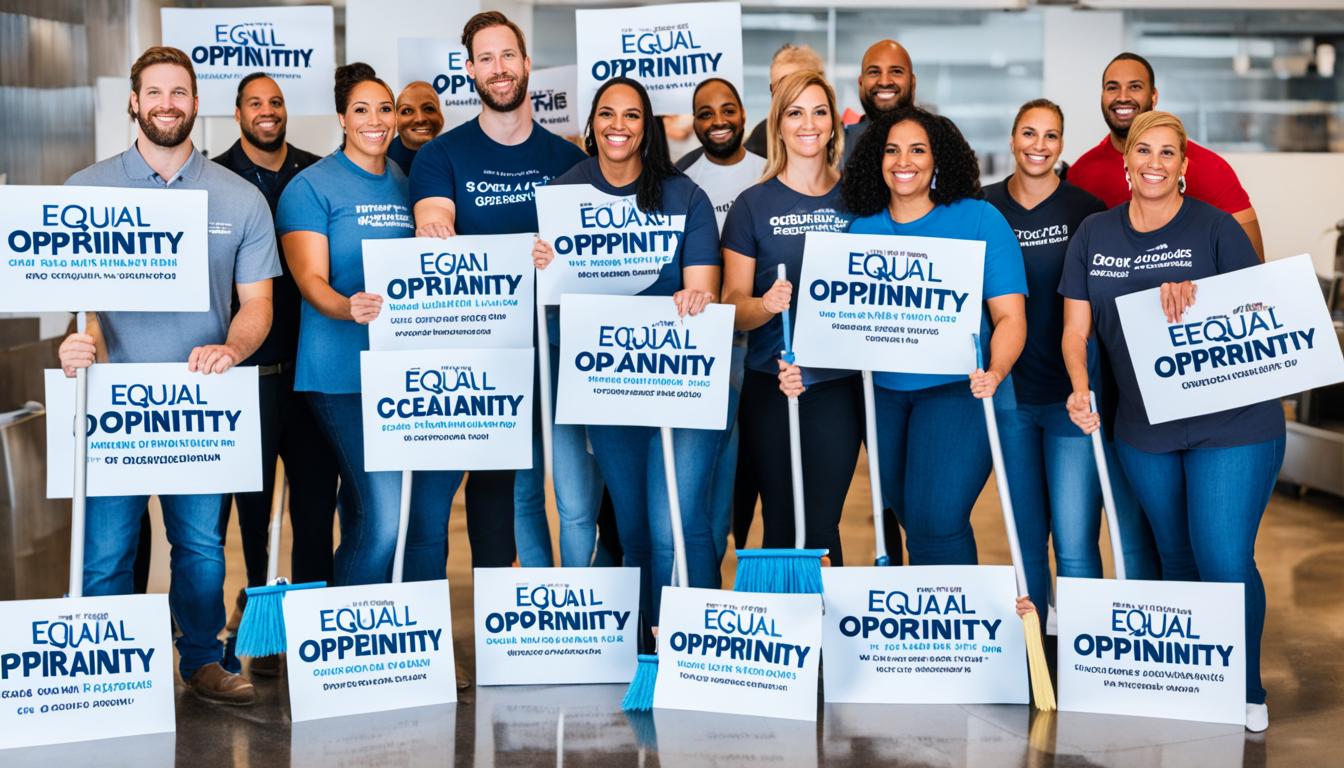I looked into the hidden struggles in Atlanta’s cleaning industry. Companies like 360 Floor Cleaning Services work hard to keep businesses clean. They also fight against discrimination in Atlanta’s floor cleaning industry. Their story shows the big issue of small business inequality in Atlanta. It’s a big problem that many ignore but affects those working in commercial floor cleaning services for Atlanta businesses.
Atlanta is more than a big city; it’s where small businesses like 360 Floor Cleaning Services face big challenges. Every call to 404-991-8895 is a step towards overcoming prejudice. They show us how to keep going, even when things seem tough.
Key Takeaways
- Ongoing efforts of minority-owned businesses like 360 Floor Cleaning Services to ensure fair treatment.
- The harsh realities of small business inequality in Atlanta within the cleaning industry.
- How discrimination affects the procurement of contracts and access to opportunities.
- The significance of community and customer support in building a more equitable industry.
- Strategies for fighting discrimination in Atlanta’s floor cleaning industry and their effectiveness.
- The crucial role of legislation and advocacy in creating lasting change.
The Reality of Racial Discrimination in Atlanta’s Cleaning Industry
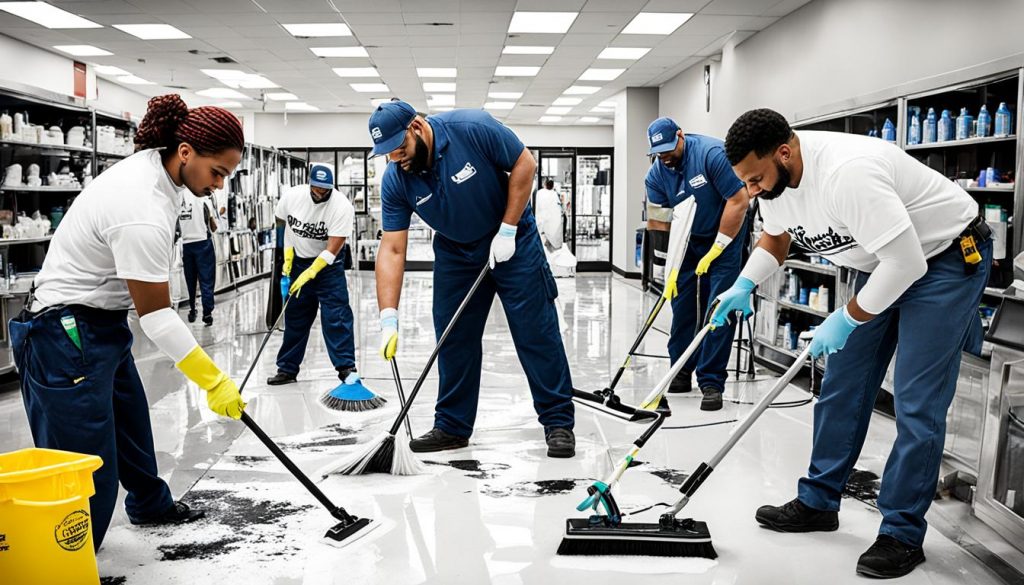
In Atlanta, GA, I’ve found that racial discrimination in floor cleaning is a big problem. It hides in the way jobs and businesses interact. I’ve looked into how this affects minority-owned cleaning businesses.
From talking to people, watching closely, and looking at labor data, a clear issue comes out. Many minority-owned cleaning businesses face bias and old industry habits. They often get fewer chances to grow compared to others.
When I talked to cleaners and business owners, I heard many stories. These stories show the big hurdles they face. They help us see the need to change unfair practices in cleaning services.
| Issue | Impact on Minority-Owned Businesses | Comparison to Non-Minority Owned Businesses |
|---|---|---|
| Limited Access to Contracts | Fewer growth opportunities, reduced income | More contracts, stable income sources |
| High-Barrier Entry Requirements | Increased operational costs, barrier to entry | Greater capacity to meet requirements, easier market access |
| Frequency of Client Referrals | Lower due to perceived stereotypes | Higher referral rates and better reputation management |
The data and stories show the big challenges from racial bias. But they also show how resilient many minority entrepreneurs are. We need to work on fixing this issue in our economy, especially in the competitive cleaning industry.
Understanding the Scope of Injustice Against Small Cleaning Companies

Small cleaning companies in Atlanta face big challenges, especially if they are owned by minorities. They deal with injustice against small cleaning companies. These challenges are complex and deeply rooted in the industry.
Disparity in Procurement Opportunities
Small cleaning companies often don’t get the same chances as big companies. They can offer great services but miss out on big contracts. This is due to business discrimination in Atlanta. It limits their growth and helps big companies dominate the market.
Bias in Lending and Financial Support
Getting financial support is hard for small cleaning companies. Lenders doubt their financial strength and reliability. This makes it hard for them to grow, innovate, and compete.
Challenges in Competitive Bidding
The bidding process is often not fair, giving big companies an unfair edge. This process stops fair competition, which is bad for diversity and innovation. It goes against the idea of fair business in Atlanta.
For more information on how to address these issues, check out 360 Floor Cleaning Services. They offer solutions to help change things for the better.
How Business Discrimination Manifests in Atlanta
In my look into business discrimination Atlanta, I found a clear pattern of unfairness. This unfairness affects how well businesses do and stops them from growing and making more money.
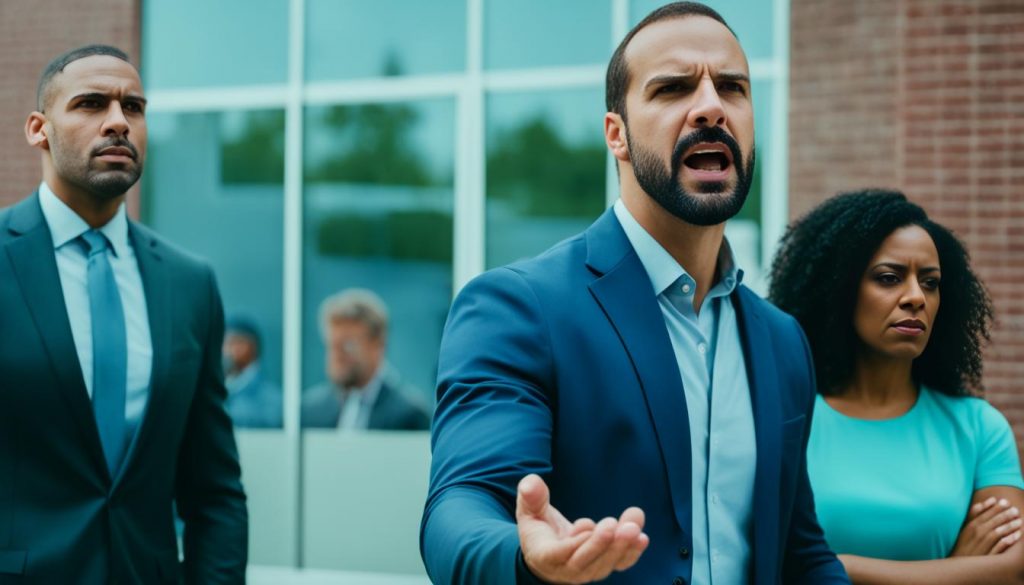
One big issue is unfair treatment in cleaning services. Minority-owned businesses often get worse deals than others. Many local business owners told me this is a real problem that needs to be fixed.
Racism in commercial cleaning is not just about personal bias. It also affects things like funding, licenses, and getting into networking events. Many businesses struggle to get into new projects, which keeps them from growing. Here are some examples of what they face:
- They have trouble getting big contracts, even if they can do the job well and offer good prices.
- They don’t get the same access to resources that help other businesses grow.
- They face racial bias when dealing with clients and when bidding on jobs.
Stories from minority-owned businesses in Atlanta show a tough situation, especially in important areas like cleaning. We need to talk about these issues to work towards a fairer business world.
“As a provider of commercial floor cleaning services for Atlanta businesses, it’s disheartening to see capable firms sidelined because of their background. This not only affects individual companies but also stunts the industry’s growth as a whole,” explained an interviewee.
Fixing these problems will take time, but understanding the issues of business discrimination Atlanta is a key step forward.
Fighting Discrimination in Atlanta’s Floor Cleaning Industry
In Atlanta, the floor cleaning industry is lively and competitive. It’s vital to combat industry bias and fight discrimination here. Companies like 360 Floor Cleaning Services lead the way in promoting fairness and equality.
Advocacy for Fair Treatment
Ensuring fair treatment means offering workshops and training on diversity. Leaders in Atlanta’s floor cleaning sector are pushing for laws that protect against discrimination. They’re actively participating in forums to make the industry more inclusive.
Building Community Support and Solidarity
Unity is key in fighting discrimination in Atlanta’s floor cleaning industry. Businesses work together to support minority-owned companies. This unity helps in sharing resources and best practices, making the industry more balanced.
Public awareness campaigns also play a big role. They teach customers and others about the value of ethical service. This helps reduce discriminatory practices.
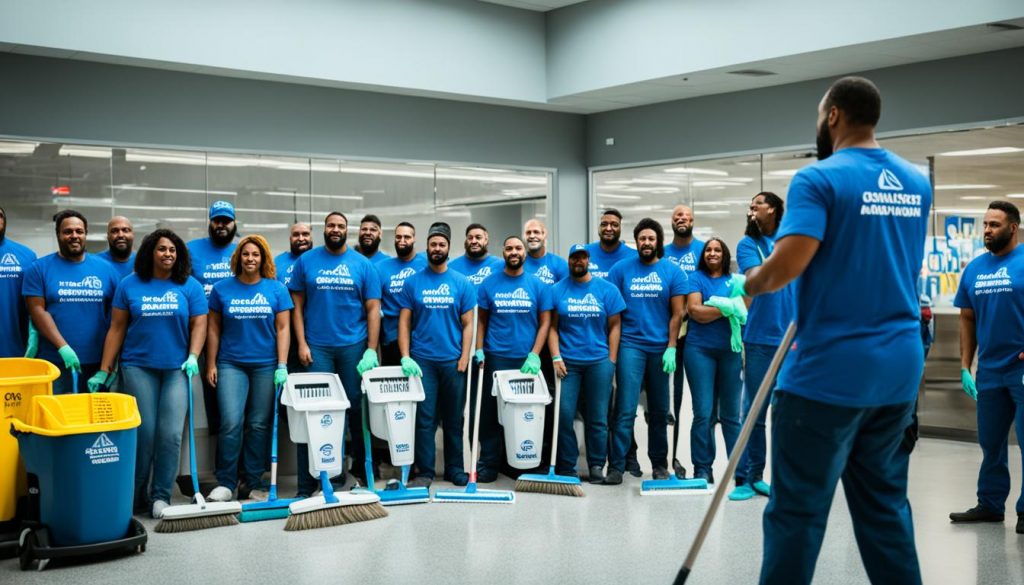
| Initiative | Description | Impact |
|---|---|---|
| Advocacy Workshops | Organized by 360 Floor Cleaning Services to educate on anti-discrimination laws | Increased awareness and compliance |
| Alliance Formations | Partnerships among competitors to boost support for minority-run businesses | Enhanced market opportunities for minorities |
| Public Campaigns | Campaigns to promote diversity within industry clients and customer base | Broader acceptance and request for equitable service options |
As we move forward, combatting industry bias in Atlanta will make the business landscape more just. It will also set a standard that values fairness and ethical practices.
Barriers to Equality: Unfair Treatment in Atlanta’s Cleaning Services
Small businesses in Atlanta face big challenges in the cleaning services industry. They often deal with unfair treatment in cleaning services. This makes it hard for them to compete and succeed. Minority-owned businesses, in particular, hit many roadblocks due to small business inequality in Atlanta. These obstacles make it tough for them to grow in a competitive market.
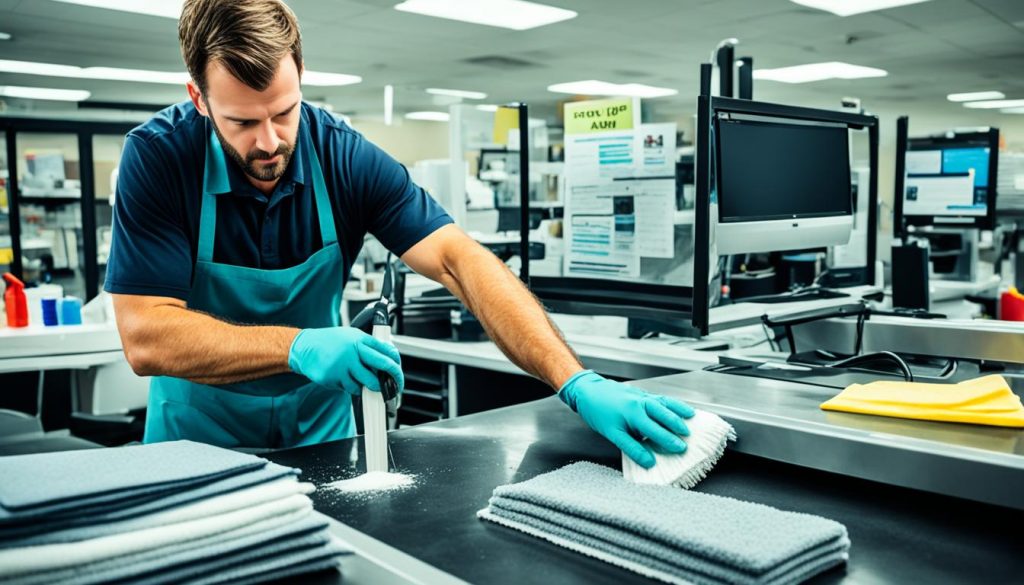
In the cleaning industry, discriminatory practices in floor cleaning are common. They affect businesses in many ways, from getting clients to getting fair contracts. These issues harm not just the businesses but also the communities they serve. They go against the values of diversity and fairness in business.
| Impact Area | Challenges Faced | Possible Solutions |
|---|---|---|
| Market Access | Limited opportunities for high-value contracts | Advocacy for policy change and inclusive tendering processes |
| Loan Accessibility | Higher rejection rates for minorities | Special financial products tailored for minority-owned businesses |
| Customer Bias | Preferences for non-minority businesses | Customer education and diversity certification |
For companies like 360 Floor Cleaning Services, overcoming these challenges is crucial. They must face the small business inequality in Atlanta head-on. To fight unfair treatment in cleaning services, they need to understand the issues and take strategic steps to solve them.
Racism in Commercial Cleaning: Minority-Owned Business Struggles
Exploring racism in commercial cleaning shows the tough challenges minority-owned cleaning businesses face in Atlanta. These businesses are key to the economy but face big hurdles from deep biases and barriers.
Systemic Barriers and Stereotypes
Minority-owned businesses in Atlanta fight against more than just market competition. They face limited access to resources, struggle to get big contracts, and are often seen as less capable. These biases and stereotypes play a big part in racism in commercial cleaning.
Addressing Client Biases
Dealing with client biases is a daily challenge for Atlanta’s commercial cleaning services. Clients’ wrong assumptions can affect how they work with these businesses and limit their growth. It’s crucial to fight industry bias in Atlanta for fair chances and treatment.
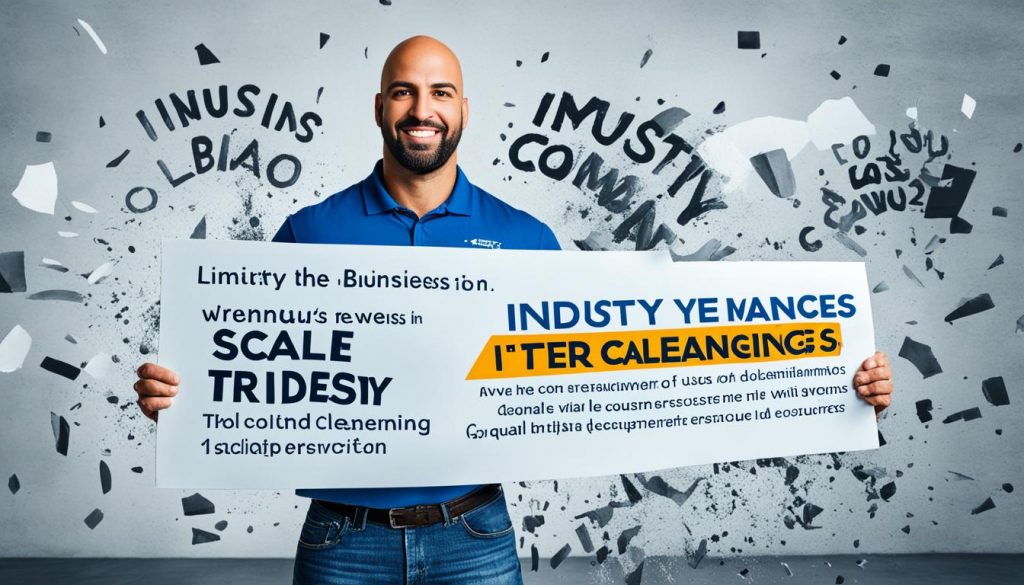
Companies like 360 Floor Cleaning Services lead in pushing for fairness and openness. They know tackling client biases boosts their business and builds a more inclusive Atlanta.
For top commercial floor cleaning services in Atlanta, contact 360 Floor Cleaning Services at 404-991-8895. Or visit them in Atlanta, GA, to see their dedication to quality and equality.
Case Studies of Small Business Inequality in Atlanta’s Cleaning Sector
In this look at small business inequality Atlanta, we focus on the floor cleaning industry. This industry faces discrimination, hurting fair business and trust in the community. By looking at specific cases, we see what changes are needed for fairness.
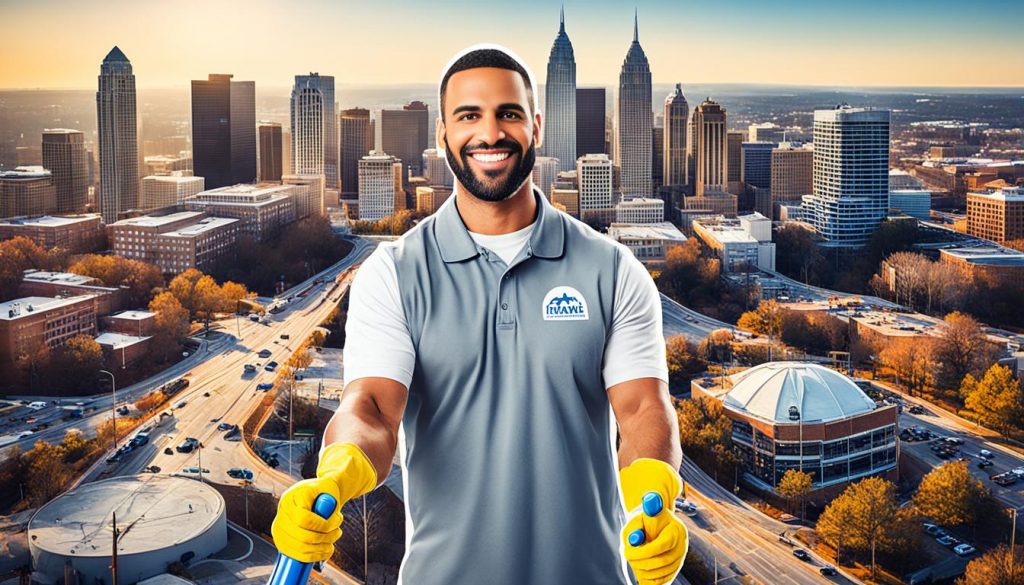
It’s important to expose unfair cleaning service. These issues are often hidden and deep-rooted. Real stories from the industry show the challenges small businesses face. They highlight the need for community help and corporate responsibility.
Successes and Setbacks in Equal Opportunity
Atlanta’s floor cleaning sector has seen both progress and hurdles. Some small businesses have overcome barriers, but many still face big challenges. They struggle to get contracts and have the same opportunities as big companies. This shows we need policies and community support to help them.
Real-life Impact of Discriminatory Practices
Discriminatory practices deeply affect businesses and their employees. For example, unequal contract access has slowed growth for some, keeping the big companies ahead. This issue is not just about growth. It’s about creating an inclusive industry that shows Atlanta’s diversity and talent.
| Impact | Example | Resolution |
|---|---|---|
| Limited Access to Contracts | Minority-owned cleaning services in Atlanta | Advocacy and revised procurement guidelines |
| Financial Instability | Cash flow issues due to delayed contract payments | Policy changes on payment terms |
| Low Staff Morale | High turnover rates among disadvantaged businesses | Improved support and working conditions |
Exposing Unfair Practices in Atlanta’s Floor Cleaning Services
In Atlanta, where a clean space can make or break a business, we must tackle exposing unfair practices in cleaning services. The issue of racism in commercial cleaning shows how business discrimination Atlanta companies face, especially in cleaning. I want to bring these issues to light, starting a conversation for change.
Atlanta is known for its diversity, but not all of it is reflected in its cleaning services. Racial biases in cleaning hurt many businesses and their workers. This bias limits chances for minority-owned businesses and keeps inequality going.
Without action, these issues will keep hurting our progress. Many stories and views from the industry show we need to act fast. Calling out these problems helps clear the way for a fairer market.
| Issue | Impact on Minority-Owned Businesses | Possible Solutions | ||
|---|---|---|---|---|
| Restricted Access to Contracts | Reduces growth opportunities and financial stability | Enforce inclusive bidding processes | ||
| Lack of Supportive Networks | Isolation from pivotal industry networks and resources | Establish mentorship and support programs | Hinders equitable business relationships and contract security | Implement training sessions to combat stereotypes |
Empowering Minority-Owned Cleaning Businesses in Atlanta
Improving minority-owned cleaning businesses in Atlanta is key to fighting small business inequality. By offering networking, mentorship, and training, these businesses can overcome bias in the industry. This creates a more inclusive space in a tough market.
Networking and Mentorship Opportunities
Networking is vital for minority-owned cleaning businesses to meet others, leaders, and clients. Regular meet-ups and workshops in Atlanta help share important tips and strategies. Mentorship programs with experienced entrepreneurs give new owners advice and support to succeed.
Access to Resources and Training
It’s not just about networking; these businesses need resources and training too. Workshops on managing money and learning about new cleaning tech are crucial. They help minority business owners offer better services and compete better in the market.
| Resource Type | Description | Impact |
|---|---|---|
| Financial Management Workshops | Training sessions focusing on budget control, funding opportunities, and financial planning. | Enhances business sustainability and funding acquisition capabilities. |
| Technical Skill Training | Programs on the latest cleaning technologies and eco-friendly practices. | Improves service quality, appealing to a broader client base concerned with sustainability. |
| Legal and Regulatory Guidance | Seminars led by legal experts that clarify state regulations and compliance requirements. | Ensures businesses operate within legal frameworks, avoiding potentially costly violations. |
Combatting Industry Bias: Strategies for Atlanta Floor Cleaners
In my ongoing effort to address and mitigate combating industry bias Atlanta, I’ve been closely observing the dynamics within the local floor cleaning sector. The challenges stemming from racism in commercial cleaning demand a comprehensive and proactive approach. Here are some strategies that have shown potential in fighting discrimination in Atlanta’s floor cleaning industry.
- Educational Workshops: Hosting workshops to educate both employees and employers about the impacts of racial bias and discrimination ensures a well-informed workforce. This forms a basic foundation for fostering an inclusive work environment.
- Policy Reform: Implementing clear, firm policies against discrimination and establishing transparent pathways for complaints can significantly deter biased behaviors.
- Community Engagement: Actively participating in local community events and collaborating with other businesses can enhance mutual understanding and support among various stakeholders.
- Regular Audits: Conducting regular audits of business practices helps to ensure that fairness prevails in hiring, promotions, and client engagements. This accountability is vital for maintaining trust and integrity within the industry.
These targeted actions contribute robustly to combating industry bias Atlanta. Aligning with services like 360 Floor Cleaning Services at 404-991-8895 can further provide an edge to businesses striving to refine their operational ethos towards equitable principles.
It’s imperative that all involved in the commercial floor cleaning sector in Atlanta band together in this vital fight against discrimination. By adopting these strategies collectively, we pave the way towards a more just and unbiased industry.
Reforming Discriminatory Practices in Floor Cleaning Through Legislation
The floor cleaning industry in Atlanta faces big challenges because of unfair treatment. Minority-owned cleaning businesses often hit many roadblocks. Laws are now seen as a key way to fix this.
Current Laws and Policies
Today, laws in Atlanta try to stop unfairness in small businesses. But, these laws are not always enforced well. Minority-owned cleaning businesses still face big challenges.
These laws try to make things fair. But, they don’t always solve the complex problems these businesses face.
Proposed Reforms and Advocacy Efforts
New laws are being suggested to help minority-owned businesses more. Advocacy groups are pushing for these changes. They want to make the floor cleaning industry fair and equal for everyone.
b
Structured advocacy and community programs
art/p>New laws aim to stop unfair treatment in floor cleaning and help minority-owned businesses. These changes are key. They aim to fix current unfairness and stop it from happening again.
| Aspect | Current Situation | Proposed Reforms |
|---|---|---|
| Legal Protection | Basic anti-discrimination laws | Enhanced laws with strict enforcement |
| Support Structures | Limited access to resources | Increased funding and resources |
| Community Engagement | Low |
Voices from the Frontline: Personal Stories of Discrimination
We’re sharing stories of racial discrimination in floor cleaning from those who’ve faced it in Atlanta. Their stories show us the harsh reality of prejudice. They also shed light on how it affects workers and business owners in the cleaning industry.
Floor Cleaners Sharing Their Experiences
Many floor cleaners have shared their shocking stories of discrimination. One worker talked about being treated unfairly at a big company in Atlanta. They said they were treated worse than their white coworkers. These stories help us see the real impact of discrimination in cleaning services.
How Discrimination Affects Employees and Business Owners
Discrimination doesn’t just hit the cleaners; it also affects business owners. Minority owners say stereotypes make it hard to get contracts. Clients doubt their skills or trustworthiness without a good reason. This discrimination hurts their businesses and stops them from growing and helping their communities.
The stories of racial discrimination in floor cleaning are crucial in fighting against workplace injustice. They inspire other businesses to push for change. This helps make the cleaning industry in Atlanta and beyond more fair for everyone.
Building a More Inclusive Industry: Next Steps for Atlanta
We need to work together to fix the inequality in Atlanta’s small businesses, especially in floor cleaning. Supporting local minority-owned cleaning businesses has shown us what we must do. We need to break down barriers and push for equality. Here are the key steps to make our industry more inclusive.
Strategies for Inclusion and Diversity
To fight discrimination in Atlanta’s floor cleaning, we must support minority-owned businesses. We need to make sure they get fair access to big contracts. We also need to create a welcoming environment for diversity.
We have two main tasks. First, we need to increase awareness and training for everyone. Second, we must make policies that support inclusion.
- Promoting training programs that address the unique challenges faced by minority-owned businesses.
- Creating mentorship opportunities with established companies in Atlanta to bolster the capabilities of emerging minority-owned cleaning businesses.
- Implementing check systems that ensure fair tender processes and equal opportunity in awarding contracts.
Role of Customers in Supporting Ethical Practices
Customers have a big impact on business practices. By choosing services from companies that fight discrimination and support minority-owned businesses, customers can make a big difference. A careful customer base helps support ethical businesses and encourages a shift towards equality and justice in the business world.
- Choosing services from minority-owned cleaning businesses that observe high ethical standards.
- Spreading awareness and recommending these businesses within their networks to improve market reach.
- Monitoring the impacts of their choices and insisting on transparency and accountability from businesses they support.
To everyone in Atlanta, I urge you to support these efforts. Whether you’re a business owner, customer, or policy-maker, your actions matter. Together, we can fight discrimination and create a more inclusive community.
Conclusion
My journey into the world of small, minority-owned businesses in Atlanta has shown me a tough truth. Racial discrimination in floor cleaning is still a big issue. It shows that even with progress, bias can still block opportunities for companies like 360 Floor Cleaning Services. We all need to work together to make our business world fair and equal.
360 Floor Cleaning Services is a shining example in Atlanta’s commercial cleaning scene. They not only clean floors but also show the potential and spirit of our city. Knowing about their hard work in Atlanta, GA, makes me believe we can all help these businesses grow. By supporting them, we help break down barriers that have held them back.
Let’s all make a promise to be more aware and supportive. By fighting against racial discrimination in cleaning, we help level the playing field for all businesses. Our actions help entrepreneurs like those at 360 Floor Cleaning Services. Together, we can make Atlanta a place where everyone has the same chance to succeed. We aim for a world where our city’s diversity is seen in every part of its business life, for everyone to see.
FAQ
What challenges do minority-owned cleaning services face in Atlanta’s floor cleaning industry?
Minority-owned cleaning services face many challenges. They deal with racial discrimination, lack of access to contracts, and financial biases. These issues make it hard for them to grow and succeed.
How does racial discrimination manifest in the cleaning industry of Atlanta?
Racial discrimination shows up in many ways in Atlanta’s cleaning industry. It can be direct, like bias in hiring, or subtle, like not getting the same chances as others. This makes it hard for minority-owned businesses to compete fairly.
Are there systemic barriers faced by small cleaning companies when it comes to procurement opportunities?
Yes, small cleaning companies often face barriers in getting contracts. This is because of discriminatory practices. They prefer bigger or non-minority companies, and the rules often don’t help small, minority-owned businesses.
Can you provide examples of business discrimination within Atlanta’s floor cleaning industry?
There are many examples of business discrimination. Minority-owned companies often get fewer contracts and face higher loan denial rates. They also get unfair terms compared to non-minority companies. This discrimination is often based on race and stereotypes.
What are some ways in which the Atlanta cleaning industry is fighting against discrimination?
The industry is fighting discrimination in many ways. They push for fair policies and practices. They also build community support and unite cleaning service providers. Companies like 360 Floor Cleaning Services lead these efforts, promoting fairness and equal chances for all.
How does racism in commercial cleaning affect minority-owned businesses in Atlanta?
Racism creates big barriers for minority-owned businesses. It makes it hard for them to get big contracts, financial support, and overcome client biases. This leads to less revenue and fewer chances to grow.
What successes and setbacks have Atlanta’s minority-owned cleaning businesses experienced?
Some minority-owned cleaning businesses have done well, thanks to their hard work and new ideas. But, they often face discrimination. This includes limited market access, unfair treatment, and trouble getting resources to grow.
How are discriminatory practices being exposed in Atlanta’s floor cleaning services?
Discriminatory practices are being exposed through investigations, whistle-blowers, and advocates for transparency. This helps bring about change and creates a fairer business environment.
What steps are being taken to empower minority-owned cleaning businesses in Atlanta?
Empowering these businesses involves networking and mentorship, giving them access to resources, and training programs. These programs aim to improve their business skills and competitiveness.
What strategies can Atlanta floor cleaners employ to combat industry bias?
They can form coalitions to push for fair practices, educate the market about diversity, join diversity certification programs, and look for clients and partners who don’t discriminate.
What legislative actions are proposed to reform discriminatory practices in the floor cleaning industry?
Proposed laws aim to make anti-discrimination laws stricter, ensure fair contract distribution, and enforce these laws. Advocacy groups are pushing for these reforms to help all cleaning service providers compete fairly.
How do personal stories of discrimination contribute to the conversation?
Personal stories make the impact of discrimination real and personal. They add truth to the discussion and can influence policy makers and the public. This can lead to changes that support equality and justice in the industry.
What role do customers play in supporting ethical practices in the industry?
Customers are key in supporting ethical practices. By choosing to hire companies that value diversity and fair labor, they can drive change. Their choices reward companies that do things right and encourage others to follow
Empathetic and Genuine:
“I’ve experienced firsthand the painful impact of discrimination in the commercial floor cleaning industry. It’s disheartening to see small businesses, particularly those owned by minorities, facing unfair treatment. This isn’t just a business issue—it’s a personal one that affects all of us.”
